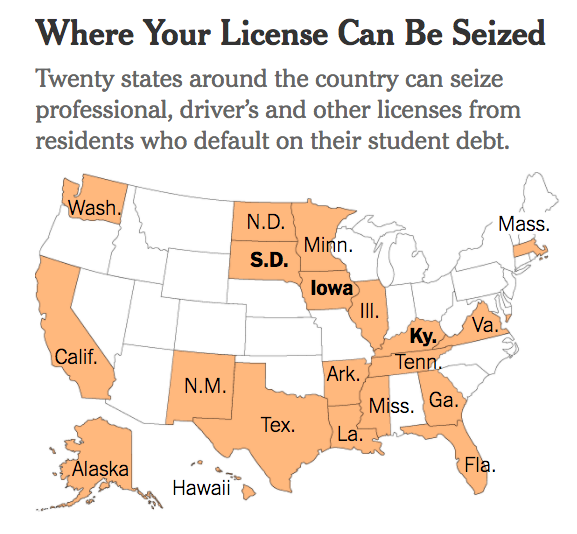
Fall behind on your student loan payments, lose your job.
Few people realize that the loans they take out to pay for their education could eventually derail their careers. But in 19 states, government agencies can seize state-issued professional licenses from residents who default on their educational debts. Another state, South Dakota, suspends driver’s licenses, making it nearly impossible for people to get to work.
As debt levels rise, creditors are taking increasingly tough actions to chase people who fall behind on student loans. Going after professional licenses stands out as especially punitive.
Firefighters, nurses, teachers, lawyers, massage therapists, barbers, psychologists and real estate brokers have all had their credentials suspended or revoked.
Determining the number of people who have lost their licenses is impossible because many state agencies and licensing boards don’t track the information. Public records requests by The New York Times identified at least 8,700 cases in which licenses were taken away or put at risk of suspension in recent years, although that tally almost certainly understates the true number.
Shannon Otto, who lives in Nashville, can pinpoint the moment that she realized she wanted to be a nurse. She was 16, shadowing her aunt who worked in an emergency room. She gaped as a doctor used a hand crank to drill a hole into a patient’s skull. She wanted to be part of the action.
It took years of school and thousands of dollars of loans, but she eventually landed her dream job, in Tennessee, a state facing a shortage of nurses.
Then, after working for more than a decade, she started having epileptic seizures. They arrived without warning, in terrifying gusts. She couldn’t care for herself, let alone anyone else. Unable to work, she defaulted on her student loans.
Ms. Otto eventually got her seizures under control, and prepared to go back to work and resume payments on her debt. But Tennessee’s Board of Nursing suspended her license after she defaulted. To get the license back, she said, she would have to pay more than $1,500. She couldn’t.
“I absolutely loved my job, and it seems unbelievable that I can’t do it anymore,” Ms. Otto said.
With student debt levels soaring — the loans are now the largest source of household debt outside of mortgages — so are defaults. Lenders have always pursued delinquent borrowers: by filing lawsuits, garnishing their wages, putting liens on their property and seizing tax refunds. Blocking licenses is a more aggressive weapon, and states are using it on behalf of themselves and the federal government.
Proponents of the little-known state licensing laws say they are in taxpayers’ interest. Many student loans are backed by guarantees by the state or federal government, which foot the bills if borrowers default. Faced with losing their licenses, the reasoning goes, debtors will find the money.
But critics from both parties say the laws shove some borrowers off a financial cliff.
Tennessee is one of the most aggressive states at revoking licenses, the records show. From 2012 to 2017, officials reported more than 5,400 people to professional licensing agencies. Many — nobody knows how many — lost their licenses. Some, like Ms. Otto, lost their careers.
“It’s an attention-getter,” said Peter Abernathy, chief aid and compliance officer for the Tennessee Student Assistance Corporation, a state-run commission that is responsible for enforcing the law. “They made a promise to the federal government that they would repay these funds. This is the last resort to get them back into payment.”
In Louisiana, the nursing board notified 87 nurses last year that their student loans were in default and that their licenses would not be renewed until they became current on their payments.
Eighty-four paid their debts. The three who did not are now unable to work in the field, according to a report published by the nursing board.
“It’s like shooting yourself in the foot, to take away the only way for these people to get back on track,” said Daniel Zolnikov, a Republican state representative in Montana.
People who don’t pay their loans back are punished “with credit scores dropping, being traced by collection agencies, just having liens,” he said. “The free market has a solution to this already. What is the state doing with this hammer?”
In 2015, Mr. Zolnikov co-sponsored a bill with Representative Moffie Funk, a Democrat, that stopped Montana from revoking licenses for people with unpaid student debt — a rare instance of bipartisanship.
The government’s interest in compelling student borrowers to pay back their debts has its roots in a policy adopted more than 50 years ago.
In 1965, President Lyndon B. Johnson signed the Higher Education Act, which created financial aid programs for college-bound students. To entice banks to make student loans, the government offered them insurance: If a borrower defaulted, it would step in and pick up the tab. The federal government relied on a network of state agencies to administer the program and pursue delinquent borrowers. (Since 2010, the federal government has directly funded all student loans, instead of relying on banks.)
By the late 1980s, the government’s losses climbed past $1 billion a year, and state agencies started experimenting with aggressive collection tactics. Some states garnished wages. Others put liens on borrowers’ cars and houses. Texas and Illinois stopped renewing professional licenses of those with unresolved debts.
The federal Department of Education urged other states to act similarly. “Deny professional licenses to defaulters until they take steps to repayment,” the department urged in 1990.
Two years ago, South Dakota ordered officials to withhold various licenses from people who owe the state money. Nearly 1,000 residents are barred from holding driver’s licenses because of debts owed to state universities, and 1,500 people are prohibited from getting hunting, fishing and camping permits.
“It’s been quite successful,” said Nathan Sanderson, the director of policy and operations for Gov. Dennis Daugaard. The state’s debt collection center — which pursues various debts, including overdue taxes and fines — has brought in $3.3 million since it opened last year. Much of that has flowed back to strapped towns and counties.
But Jeff Barth, a commissioner in South Dakota’s Minnehaha County, said that the laws were shortsighted and that it was “better to have people gainfully employed.”
In a state with little public transit, people who lose their driver’s licenses often can’t get to work.
“I don’t like people skipping out on their debts,” Mr. Barth said, “but the state is taking a pound of flesh.”
Mr. Sanderson countered that people did not have to pay off their debt to regain their licenses — entering into a payment plan was enough.
But those payment plans can be beyond some borrowers’ means.
Tabitha McArdle earned $48,000 when she started out as a teacher in Houston. A single mother, she couldn’t keep up with her monthly $800 student loan payments. In March, the Texas Education Agency put her on a list of 390 teachers whose certifications cannot be renewed until they make steady payments. She now has no license.
Randi Weingarten, president of the American Federation of Teachers, who has worked to overturn these laws, called them “tantamount to modern-day debtors’ prison.”
States differ in their rules and enforcement mechanisms. Some, like Tennessee, carefully track how many borrowers are affected, but others do not keep even informal tallies.
In Kentucky, the Higher Education Assistance Authority is responsible for notifying licensing boards when borrowers default. The agency has no master list of how many people it has reported, according to Melissa F. Justice, a lawyer for the agency.
But when the agency sends out default notifications, licensing boards take action. A public records request to the state’s nursing board revealed that the licenses of at least 308 nurses in Kentucky had been revoked or flagged for review.
In some states, the laws are unused. Hawaii has a broad statute, enacted in 2002, that allows it to suspend vocational licenses if the borrower defaults on a student loan. But the state’s licensing board has never done so, said William Nhieu, a spokesman for Hawaii’s Department of Commerce and Consumer Affairs, because no state or federal student loan agencies have given it the names of delinquent borrowers.
Officials from Alaska, Iowa, Massachusetts and Washington also said their laws were not being used. Oklahoma and New Jersey eliminated or defanged their laws last year, with bipartisan support.
But in places where the laws remain active, they haunt people struggling to pay back loans.
Debra Curry, a nurse in Georgia, fell behind on her student loan payments when she took a decade off from work to raise her six children. In 2015, after two years back on the job, she received a letter saying that her nursing license would be suspended unless she contacted the state to set up a payment plan.
Ms. Curry, 58, responded to the notice immediately, but state officials terminated her license anyway — a mistake, she was told. It took a week to get it reinstated.
“It was traumatic,” Ms. Curry said. She now pays about $1,500 each month to her creditors, nearly half her paycheck. She said she worried that her debt would again threaten her ability to work.
“I really do want to pay the loans back,” she said. “How do you think I’m going to be able to pay it back if I don’t have a job?”
3 WAYS TO SHOW YOUR SUPPORT
- Log in to post comments
















